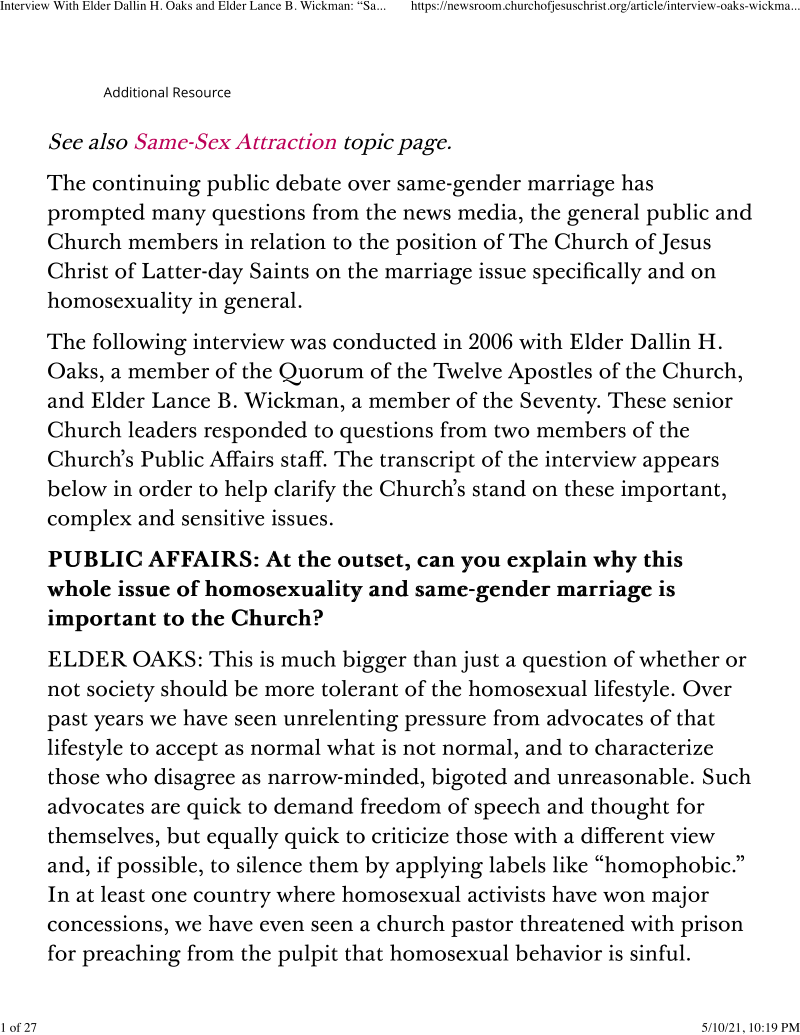Dallin H. Oaks states that the there have been abusive practices related to aversion therapy.
- Type
- Interview
- Source
- Church Newsroom LDS
- Hearsay
- Scribed VerbatimDirect
- Reference
Interview With Elder Dallin H. Oaks and Elder Lance B. Wickman: “Same-Gender Attraction," Church Newsroom, accessed May 10, 2021
- Scribe/Publisher
- Church Newsroom
- Audience
- Internet Public
- Transcription
PUBLIC AFFAIRS: Is therapy of any kind a legitimate course of action if we’re talking about controlling behavior? If a young man says, “Look, I really want these feelings to go away… I would do anything for these feelings to go away,” is it legitimate to look at clinical therapy of some sort that would address those issues?
ELDER WICKMAN: Well, it may be appropriate for that person to seek therapy. Certainly the Church doesn’t counsel against that kind of therapy. But from the standpoint of a parent counseling a person, or a Church leader counseling a person, or a person looking at his or her same-gender attraction from the standpoint of ‘What can I do about it here that’s in keeping with gospel teachings?’ the clinical side of it is not what matters most. What matters most is recognition that ‘I have my own will. I have my own agency. I have the power within myself to control what I do.’
Now, that’s not to say it’s not appropriate for somebody with that affliction to seek appropriate clinical help to examine whether in his or her case there’s something that can be done about it. This is an issue that those in psychiatry, in the psychology professions have debated. Case studies I believe have shown that in some cases there has been progress made in helping someone to change that orientation; in other cases not. From the Church’s standpoint, from our standpoint of concern for people, that’s not where we place our principal focus. It’s on these other matters.
ELDER OAKS: Amen to that. Let me just add one more thought. The Church rarely takes a position on which treatment techniques are appropriate, for medical doctors or for psychiatrists or psychologists and so on.
The second point is that there are abusive practices that have been used in connection with various mental attitudes or feelings. Over-medication in respect to depression is an example that comes to mind. The aversive therapies that have been used in connection with same-sex attraction have contained some serious abuses that have been recognized over time within the professions. While we have no position about what the medical doctors do (except in very, very rare cases — abortion would be such an example), we are conscious that there are abuses and we don’t accept responsibility for those abuses. Even though they are addressed at helping people we would like to see helped, we can’t endorse every kind of technique that’s been used.
- BHR Staff Commentary
- Citations in Mormonr Qnas
The B. H. Roberts Foundation is not owned by, operated by, or affiliated with the Church of Jesus Christ of Latter-day Saints.

